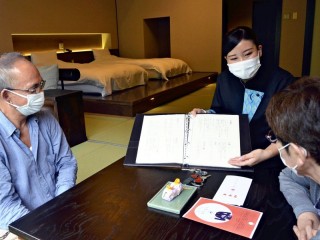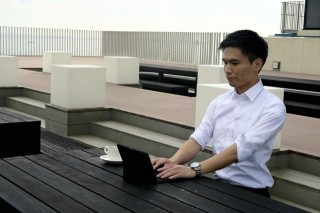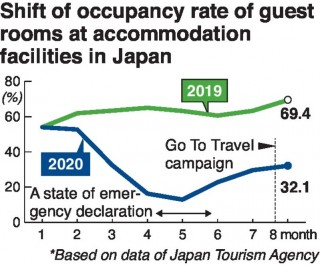Loading
Search
▼ Hotels, Ryokan Inns Suffer ‘Double Whammy’ Due To Coronavirus In Japan
- Category:Other
The following is the second installment in a series looking at efforts by the tourist industry to survive the economic effects of the novel coronavirus outbreak.
When customers arrive at Hoshino Resorts KAI Kawaji, in the Kawaji Onsen hot spring area in Nikko, Tochigi Prefecture, they are asked to have their body temperature checked and disinfect their hands. Then they are directly shown to their rooms. This check-in procedure is applied to every guest.
Before going to onsen bath, customers can scan a QR code in their rooms with their smartphones to find out if the bath is crowded.
The hotel has simplified the explanation for its kaiseki ryori (a traditional Japanese meal in courses), and informs guests that they themselves will be the ones scooping rice into their own bowls.
he characters for “3 mitsu kaihi” — avoiding the Three Cs (closed spaces, crowded places and close-contact settings) — could be seen on a T-shirt worn by Yoshiharu Hoshino, chief executive officer of Hoshino Resorts Inc., in an online press conference on Oct. 13, where he elucidated his company’s thorough measures against the novel coronavirus.
Hoshino Resorts operates luxury hot spring ryokan traditional Japanese inns, among other businesses. Recently, occupancy rates at about two-thirds of its 40 facilities in Japan and abroad have returned to almost the same level of last year.
The government’s Go To Travel tourism promotion campaign program, which gives a maximum discount for users of expensive accommodation facilities, has worked favorably for the company.
“There are no projects that would be stopped due to the spread of the coronavirus,” Hoshino said proudly. ■ Other businesses derailed
Aside from Hoshino Resorts, there are not many accommodation facilities that have recovered from the disastrous effects of the coronavirus crisis. The accommodation industry has been hard hit by the restrictions on travel to Japan from abroad and calls for people to avoid going out.
According to the Japan Tourism Agency, the total number of overnight visitors at accommodation facilities in May this year during the state of emergency period plunged by 84.9% from a year earlier to 7.78 million. The occupancy rate of guest rooms dropped by 50.3 points to 12.9% on a year-on-year basis.
After that, partly due to the effects of the Go To Travel campaign, the total number of overnight customers has gradually increased, but the figure as of August did not reach to even half of the year-earlier level.
However, the plunge in overnight visitors is only part of the industry’s predicament.
For large hotels, profits from wedding ceremonies, banquets and conferences, among other events, represent half of their sales. And now these event venues are considered places where crowds of participants can be easily infected with the coronavirus.
This has resulted in widespread cancellations of reservations along with reductions in the sizes of these once lucrative events, replaced by teleconferences, which many companies have resorted to.
A person related to a main hotel said in disappointment, “The coronavirus has dealt the industry a double whammy.”
The consolidated half-year sales of Fujita Kanko Inc., which operates Hotel Chinzanso Tokyo and other facilities, for the first half of 2020 declined by about 60% on a year-on-year basis in each project category of accommodations, wedding ceremonies and banquets.
■ ‘Equipment’ industry
Hotel businesses are generally referred to as the “equipment” industry, which needs large-scale investment to build facilities at the initial stage. It is common for such operators to start their businesses by borrowing a huge sum of money from financial institutions. But this carries the risk that once their performance deteriorates, they could have difficulty repaying these debts.
WBF Hotel and Resorts Co., based in Osaka, went bankrupt in April. It opened more than five hotels during the one-year period until February 2020 in expectation of an increasing number of foreign tourists. But when the number of foreign guests decreased because of the coronavirus outbreak, it suddenly suffered funding difficulties.
According to Teikoku Databank, 59 hotels and ryokan inns have gone bankrupt as of Oct. 23 because of the effects of the outbreak. By industry, accommodations were the second-largest group after eating and drinking establishments at 95 failures.
There has been a move by corporations to withdraw from the hotel industry. Many cases asking for hotel buyout have been brought to Toshio Motoya, chief executive officer of hotel chain Apa Group.
“A hotel under construction in Kyoto has been on sale,” Motoya revealed.
■ New style of travel
Tokyo Bay Tokyu Hotel in Urayasu, Chiba Prefecture, resumed operations in mid-October for the first time in about six months.
At a press conference on Oct. 15, Daisuke Tone, deputy general manager of the hotel, said strongly, “We’ll imagine what customers who have changed their mind-sets due to the coronavirus are seeking, and evolve our services to meet their requests.”
Taking advantage of its location facing Tokyo Bay, the hotel is attempting to attract guests with a “workation” plan that provides places for remote working while enjoying a vacation. The aim of the plan is have businesspeople make up for occupancy that used to be filled by foreign visitors on weekdays.
A workation is a new style of teleworking that allows people to work or participate in training sessions at resort spots or elsewhere, or enjoy sightseeing by extending their period of stay before and after their business trips.
Workations began to spread in the United States and Europe in the early 2010s. In Japan, Wakayama, Nagano and other prefectures are now promoting the idea. It is expected to produce effects in terms of the decentralization of tourist seasons, the diversification of work styles and regional revitalizations, among others.
Prince Hotels Inc. has introduced a workation plan at its hotels within national parks nationwide, including the Akan-Mashu National Park in Hokkaido.
Takashi Goto, president of Seibu Holdings Inc., the parent company of Prince Hotels, emphatically said: “Tourism is central part of Japan’s growth strategy. We’ll introduce new styles for hotels at 100 locations nationwide in the coming 10 years.”
In Atami, a hot spa area in Shizuoka Prefecture that is less than one hour by a Shinkansen bullet train from Tokyo, there has been a sudden increase in the number of inquiries to local real estate agencies for properties than can be repurposed for workations.
On Oct. 23, the Japan Tourism Agency established a panel of experts from economic and tourism circles to discuss how to spread new styles of travel, including workations. The panel has started discussing how to address days off and working styles.
In October, the Japan Business Federation (Keidanren) also concluded a memorandum with the Japan Travel and Tourism Association for the expansion of this new style of travel.
Makoto Sakuma, an associate principal researcher at NLI Research Institute, said: “Famous novelists, including Yasunari Kawabata, stayed for long periods at hot spring ryokan inns to write their works.
If people work at hotels or ryokan inns, which are extraordinary locations for them, people may be able to come up with ideas that would not be possible at their offices. Workations have various potentials.”
When customers arrive at Hoshino Resorts KAI Kawaji, in the Kawaji Onsen hot spring area in Nikko, Tochigi Prefecture, they are asked to have their body temperature checked and disinfect their hands. Then they are directly shown to their rooms. This check-in procedure is applied to every guest.
Before going to onsen bath, customers can scan a QR code in their rooms with their smartphones to find out if the bath is crowded.
The hotel has simplified the explanation for its kaiseki ryori (a traditional Japanese meal in courses), and informs guests that they themselves will be the ones scooping rice into their own bowls.
he characters for “3 mitsu kaihi” — avoiding the Three Cs (closed spaces, crowded places and close-contact settings) — could be seen on a T-shirt worn by Yoshiharu Hoshino, chief executive officer of Hoshino Resorts Inc., in an online press conference on Oct. 13, where he elucidated his company’s thorough measures against the novel coronavirus.
Hoshino Resorts operates luxury hot spring ryokan traditional Japanese inns, among other businesses. Recently, occupancy rates at about two-thirds of its 40 facilities in Japan and abroad have returned to almost the same level of last year.
The government’s Go To Travel tourism promotion campaign program, which gives a maximum discount for users of expensive accommodation facilities, has worked favorably for the company.
“There are no projects that would be stopped due to the spread of the coronavirus,” Hoshino said proudly. ■ Other businesses derailed
Aside from Hoshino Resorts, there are not many accommodation facilities that have recovered from the disastrous effects of the coronavirus crisis. The accommodation industry has been hard hit by the restrictions on travel to Japan from abroad and calls for people to avoid going out.
According to the Japan Tourism Agency, the total number of overnight visitors at accommodation facilities in May this year during the state of emergency period plunged by 84.9% from a year earlier to 7.78 million. The occupancy rate of guest rooms dropped by 50.3 points to 12.9% on a year-on-year basis.
After that, partly due to the effects of the Go To Travel campaign, the total number of overnight customers has gradually increased, but the figure as of August did not reach to even half of the year-earlier level.
However, the plunge in overnight visitors is only part of the industry’s predicament.
For large hotels, profits from wedding ceremonies, banquets and conferences, among other events, represent half of their sales. And now these event venues are considered places where crowds of participants can be easily infected with the coronavirus.
This has resulted in widespread cancellations of reservations along with reductions in the sizes of these once lucrative events, replaced by teleconferences, which many companies have resorted to.
A person related to a main hotel said in disappointment, “The coronavirus has dealt the industry a double whammy.”
The consolidated half-year sales of Fujita Kanko Inc., which operates Hotel Chinzanso Tokyo and other facilities, for the first half of 2020 declined by about 60% on a year-on-year basis in each project category of accommodations, wedding ceremonies and banquets.
■ ‘Equipment’ industry
Hotel businesses are generally referred to as the “equipment” industry, which needs large-scale investment to build facilities at the initial stage. It is common for such operators to start their businesses by borrowing a huge sum of money from financial institutions. But this carries the risk that once their performance deteriorates, they could have difficulty repaying these debts.
WBF Hotel and Resorts Co., based in Osaka, went bankrupt in April. It opened more than five hotels during the one-year period until February 2020 in expectation of an increasing number of foreign tourists. But when the number of foreign guests decreased because of the coronavirus outbreak, it suddenly suffered funding difficulties.
According to Teikoku Databank, 59 hotels and ryokan inns have gone bankrupt as of Oct. 23 because of the effects of the outbreak. By industry, accommodations were the second-largest group after eating and drinking establishments at 95 failures.
There has been a move by corporations to withdraw from the hotel industry. Many cases asking for hotel buyout have been brought to Toshio Motoya, chief executive officer of hotel chain Apa Group.
“A hotel under construction in Kyoto has been on sale,” Motoya revealed.
■ New style of travel
Tokyo Bay Tokyu Hotel in Urayasu, Chiba Prefecture, resumed operations in mid-October for the first time in about six months.
At a press conference on Oct. 15, Daisuke Tone, deputy general manager of the hotel, said strongly, “We’ll imagine what customers who have changed their mind-sets due to the coronavirus are seeking, and evolve our services to meet their requests.”
Taking advantage of its location facing Tokyo Bay, the hotel is attempting to attract guests with a “workation” plan that provides places for remote working while enjoying a vacation. The aim of the plan is have businesspeople make up for occupancy that used to be filled by foreign visitors on weekdays.
A workation is a new style of teleworking that allows people to work or participate in training sessions at resort spots or elsewhere, or enjoy sightseeing by extending their period of stay before and after their business trips.
Workations began to spread in the United States and Europe in the early 2010s. In Japan, Wakayama, Nagano and other prefectures are now promoting the idea. It is expected to produce effects in terms of the decentralization of tourist seasons, the diversification of work styles and regional revitalizations, among others.
Prince Hotels Inc. has introduced a workation plan at its hotels within national parks nationwide, including the Akan-Mashu National Park in Hokkaido.
Takashi Goto, president of Seibu Holdings Inc., the parent company of Prince Hotels, emphatically said: “Tourism is central part of Japan’s growth strategy. We’ll introduce new styles for hotels at 100 locations nationwide in the coming 10 years.”
In Atami, a hot spa area in Shizuoka Prefecture that is less than one hour by a Shinkansen bullet train from Tokyo, there has been a sudden increase in the number of inquiries to local real estate agencies for properties than can be repurposed for workations.
On Oct. 23, the Japan Tourism Agency established a panel of experts from economic and tourism circles to discuss how to spread new styles of travel, including workations. The panel has started discussing how to address days off and working styles.
In October, the Japan Business Federation (Keidanren) also concluded a memorandum with the Japan Travel and Tourism Association for the expansion of this new style of travel.
Makoto Sakuma, an associate principal researcher at NLI Research Institute, said: “Famous novelists, including Yasunari Kawabata, stayed for long periods at hot spring ryokan inns to write their works.
If people work at hotels or ryokan inns, which are extraordinary locations for them, people may be able to come up with ideas that would not be possible at their offices. Workations have various potentials.”
- October 28, 2020
- Comment (0)
- Trackback(0)




